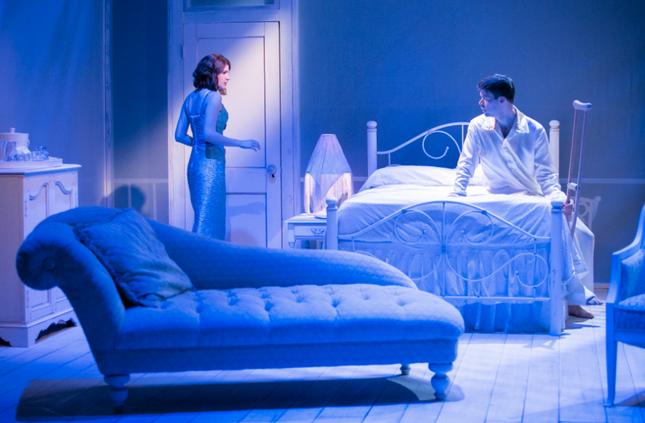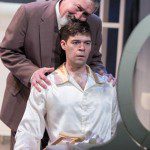At the New Keegan: an Intimate ‘Cat on a Hot Tin Roof’
By • August 7, 2015 0 2175

One thing you can say about the folks at the Keegan Theatre: they don’t shy from a challenge.
To inaugurate its new and permanent digs at the Keegan on Church Street in Dupont Circle, co-directors Mark and Susan Marie Rhea chose to open with Tennessee Williams’s still startling and ferocious 1955 Pulitzer Prize-winning play “Cat on a Hot Tin Roof” in all its three-hours-plus fury, a play that on scale of one to ten in terms of tasking and testing actors and directors as well as the patience and will of the audience is around an 11.
If that wasn’t enough, the official opening performance July 30 heightened the difficulty level with the cancellation of two preview performances due to weather difficulties that occurred during the last finishing touches to the renovation.
That probably accounted for a certain under-rehearsed quality to parts the production, but it also ratcheted up the raw emotional qualities of some of the longer scenes, and the Keegan’s gift and history for intimate directness. What you got was a true, authentic version of “Cat on a Hot Tin Roof,” which in terms of its history is a play full of the ghosts of legendary past productions and a brilliant, if entirely muddled all-star movie version to haunt actors and directors.
The renovation includes new entrance and a glossy and glassy outdoor sheen, plus the addition of several new rest rooms throughout the theater, an addition that was entirely welcome for a play lasting three hours plus, three acts with two intermission.
It’s a taxing proposition for an audience, but this is the reward: the realization in the end of just what a forceful masterpiece of American theater this Tennessee Williams play is, what a gift for language, mixing crudeness with poetic imagery, he had, how he managed to peel the onioned layers of lies the characters hold savagely close, and how this more than 60-year-old play resonates so sharply today.
The Keegan stage has remained the same—it makes any production an exercise in intimacy. With the characters in “Cat,” this is a proximity that can sear.
Here we are again in the brilliantly white bedroom, occupied by the self-described Maggie the Cat in the most alluring slip in stage history, holding forth, pacing more like a lioness than a mere cat, laying out the Southern situation, gathered here in this thousands of acres-estates for the birthday of Big Daddy, her husband’s overbearing father.
Big Daddy may be dying, but he thinks he’s dodged a cancer bullet. At stake is love and hatred and Big Daddy’s estate. Maggie wants it for herself and her husband Brick, haunted by the death of his best friend Skipper, refusing to have relations with his wife, guzzling booze by the shot glass at an alarming rate until he hears the click that stops his pain. His lawyer brother Gooper and his snooping, snooty wife Mae have produced a passel of what Maggie calls “no-neck monsters,” five kids with another on the way. Big Mama, strident, emotional frets over Big Daddy’s health.
Williams, a gay man and Catholic son of the South, takes his time with the characters—in a long first act, Maggie, played with the intensity of a striving but unsatisfied woman, using her Southern accent like a musical story-telling instrument by company member Brianna Letourneau, dominates the stage, alternatively haranguing and trying to seduce her husband Brick, trying to prod and provoke him into life.
When Big Daddy arrives, he comes on with strength, bolstered by news of an apparent escape from the Big C judgement, and he revels and reeks of the life force that he carries with him—he’s an inhaler, a dominate storm force. It’s a kinetic performance by Kevin Adams. It’s not in the big, bigger-than-life bigness of a Burl Ives or even James Earl Jones. It’s mainly real and layered. Adams makes an aria out of storming into the room and yelling, “What’s that smell? I smell . . . mendacity.” He lingers over the little-used word, as if it were a bomb that was stealthily building to explosion.
This “Cat” is directed and laid out to the point where every word counts. You strain to listen and hear it right, accompanied by the atmospherics of that family house, veranda, walkways, voices heard from outside, a storm exploding, servants walking in and out singing fragments of gospel songs, peeking in, passing by.
In this scene—once occupied by the likes of blue-eyed Paul Newman in the movie version—Kevin Hasser is a great deflector as Brick. He pushes aside accusations, the allure of Maggie, Big Daddy’s attempts to push him into action. That understated quality to this Brick is as haunting as every drinks he pours and downs.
The production isn’t perfect. It’s rough around the edges, but never at the core. Sometimes, the sheer length of it can bludgeon the audience member, who’s bearing witness.
You watch this, and you see that has the quality of a classic play. It has the ability to drag you in and make you hear the music of our times.
The movie version muddled the issue of the true nature of Brick’s relationship with Skipper, which appeared to be homosexual, even though Brick denies it. “No,” he says. “Not that. People hate that. It wasn’t that. People think it’s disgusting.” That phrase just a few days after gay marriage became the law of the land resonates mightly. So does the plantation mentality and atmosphere in which Big Daddy strides so confidently, given recent events.
Mostly, much of this production is a gift, not only to the audience, but to Tennessee Williams.
“Cat on a Hot Tin Roof” runs July 7 through July 25 at the Keegan Theater at 1724 Church St. NW.
- Maggie (Brianna Letourneau) and Brick (Kevin Hasser) in ‘Cat on a Hot Tin Roof’ at the Keegan Theatre. | C. Stanley Photography




